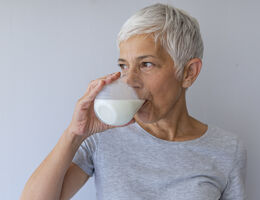
Aug. 11, 2025—Menopause is a natural part of life, not a disease. But it can cause troublesome symptoms, including:
- Mood swings.
- Hot flashes.
- Night sweats.
- Difficulty sleeping.
- Weight gain.
Not everyone has the same symptoms, and the level of their intensity can vary. But if menopause symptoms are disrupting your daily life, changing your diet can help. Fortunately, eating the right foods can help ease menopause symptoms. What's more, a healthy diet can help counter health risks that tend to rise during and after menopause. For instance, calcium guards against bone density loss, which can cause osteoporosis. And healthy fats can reduce your risk of heart disease, says the Academy of Nutrition and Dietetics.
How to build a menopause-friendly diet
Choose a balanced approach. Eating a variety of healthy foods not only helps ensure that you'll get more nutrients into your body, it also keeps you from becoming bored with your food.
Pick lean protein. Protein helps you feel full after meals and preserves muscle mass. Fish, lean meat, tofu, beans and eggs are great choices.
Don't forget dairy. Milk, cheese and yogurt are excellent sources of calcium and vitamin D, both of which protect your bones. If you are vegan or don't consume dairy, eat plenty of beans and green, leafy vegetables, says AARP.
Eat the rainbow. Brightly colored fruits and vegetables are loaded with antioxidants, vitamins, minerals and fiber—which may help keep menopause symptoms under control. They're filling and low in calories too.
Stay hydrated. If you're experiencing hot flashes, try sipping cold water. Doing this before bed could reduce hot flashes during the night.
Know what to avoid. Certain foods and drinks can aggravate your menopause symptoms. They include:
- Alcohol. It may raise your body temperature, and it typically lowers the quality of your sleep.
- Caffeine. Like alcohol, it can disrupt a good night's sleep. It also can make hot flashes and night sweats more frequent and intense.
- Carbohydrates. Carbs are comfort foods, yes. But they also spike your blood sugar, which can lead to weight gain in menopause.
- Spicy foods. They can trigger or worsen hot flashes.
Get expert advice. If menopause symptoms are affecting you, ask your doctor or OB-GYN for individual advice. They can suggest treatments and lifestyle changes to help manage symptoms.
How menopause-savvy are you?
Take our quiz to find out.
Sources
- AARP. "4 Foods to Help Ease Menopause Symptoms—and 4 to Avoid." https://www.aarp.org/health/conditions-treatments/diet-to-ease-menopause-symptoms.html.
- Academy of Nutrition and Dietetics. "Nutrition and Menopause." https://www.eatright.org/health/wellness/healthful-habits/nutrition-and-menopause.